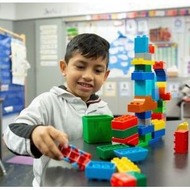Resources for PreK - Grade 3 Reentry
(View Complete Item Description)This document was created by staff from the Washington Office of Superintendent of Public Instruction and the nine Educational Service Districts as a resource to educators across the earliest years of school, PreK–3rd grade. It is intended to support a smooth transition this fall for students who are just beginning their formal education or who may have experienced disruptions to their early education due to COVID-19
Material Type: Teaching/Learning Strategy




















